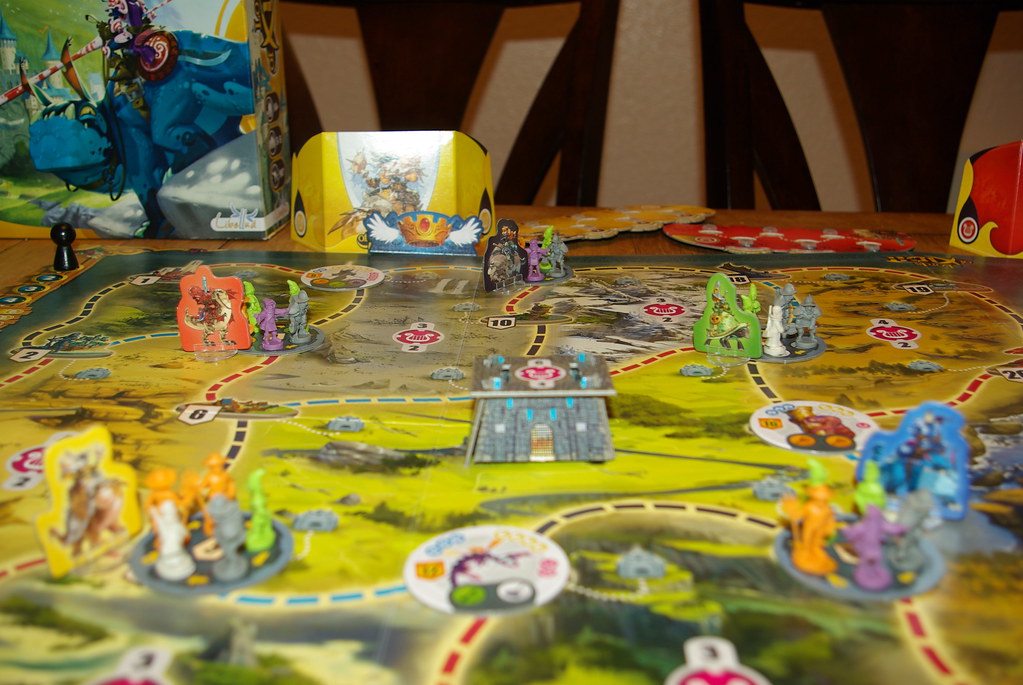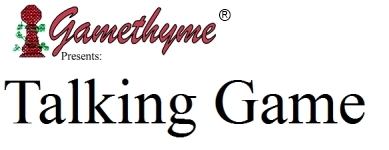I liked it.
Lords of Xidit is apparently a new version of a game previously called Himalaya. As with many new versions, there are a few changes. Unfortunately, I don't know Himalaya, But there is a file that Libellud put together that lists the changes.
In Lords of Xidit, you will program your turn six moves (one year) in advance. Each move, you can either move, take action, or pass.
Moves involve moving your piece along a colored road to the next city. Taking action is either recruiting the lowest-value troop in a given city or spending troops you have recruited to deal with a threat. And passing is ... well ... doing nothing.

The pieces are good. The board is bright. The rules are pretty straightforward. The only complaint I have with the game is one of player interaction: There isn't much.
Because you're programming six turns in advance, any player interaction is limited to timing things. In fact, that's why "Pass" is an available action. Since you can only recruit once per city per year, and you always recruit the lowest-valued unit in a city, you will sometimes want to pass so that your opponent can draft first and grab that peasant.
Recruiting is easy. Just show up and take action. Dealing with the threats, however, is a bit trickier, because each threat is a monster who is menacing that city. And each monster requires a specific set of troops to be defeated. Some of them are easier than others. And each threat gives you a reward for defeating it - more on that in a few minutes.
But if you defeat a threat two actions before I was programmed to go to that city and defeat that threat, I'll get nothing. My "Action" turns into a "Pass." Which, as I'm sure you can guess, is a bit frustrating.
So the extent of the player interaction is trying to figure out who will be where and at what point so that you can either get there ahead of them to deal with the threat or just after them so that you can recruit the better troop.
Three times during the game, a census is held, and the players who have the most of each type of troop will gain a benefit of some sort. These benefits are identical to the benefits you'll get from slaying monsters, only toned down (usually).
Each threat tile has three specific benefits printed on it. You can choose two of the three. You will either win money, fame (in the form of bard tokens) or the support of the Wizards' Guild (in the form of a Wizard's Tower marker). Early in the game, players will scramble for the Guild markers, because each city's branch of the Guild will only support one player. Later in the game, money and fame become more important.
After twelve years, a winner is determined through a knockout. One of the three victory conditions (which are tied to the three possible rewards) is calculated, and the player is last place is eliminated. Then the second condition is calculated and, again, the player is last place is eliminated. Finally, the third condition is checked, and there will be only one player left standing.
If you have five players, then the first condition eliminates two players instead of one.
The order the conditions are checked is random, and changes every game. However they are set up before play starts, so players know which conditions are most important to avoid elimination. But you can't ignore any of the conditions.
Your first play of this game will - like many games - be a lot of random flailing and looking for the strategy. After multiple plays, you'll start to look at the "upcoming" part of the board, where you can see where the next few threats will appear so you can be there and ready before they are even on the board.
Long-term, I think the game has legs. It's not the best game I brought back from GenCon, but it's a long ways from the bottom of the pile. I don't expect this to hit the table every week, but I do think it's going to be a regular fixture in my car so that we can play it if we want to.
And it looks like I'm not alone in that train of thought, either.

No comments:
Post a Comment